Teacher Training at JIEI:The Jeollanamdo International English Institute
Interview by Dr.David Shaffer.
In this issue of the Gwangju News, we have decided to interview two members of the GwangjuJeonnam Chapter of KOTESOL who are teacher trainers at the Jeollanamdo International Education Institute (JIEI). The JIEI is a government-funded training center in Yeosu serving the entire province amd is now in its second year of operation. Kristy Dolson and Peter Lucarotti graciously agreed to this interview to tell us about JIEI and their teacher-training experiences there.
Gwangju News (GN): I’d like to first thank you both for so happily agreeing to do this interview. Could you start by giving us a bit of information about your lives before Korea?
Kristy: It’s an honor to be interviewed by the Gwangju News, thank you for the opportunity. Korea has really shaped who I am and how I think of myself as a person and as a teacher, so I think it’s safe to say that I had no life before Korea.
Peter: Thank you for reaching out to us for an interview. I’ve been in Korea for a while now, so it’s honestly a bit difficult to think about what I was doing before moving here. I’m originally from the east coast of Canada and moved out west to pursue a career in journalism. That didn’t work out, and Korea allowed me to move my life in a different direction. I’m incredibly grateful for that opportunity.

GN: What brought you to Korea, and what did you do before joining the teaching staff at the Jeollanamdo International Education Institute (JIEI)?
Kristy: I figured out in middle school that I wanted to live in Asia, and teaching English overseas seemed like the best way to attain that goal, so I attended Brock University’s Concurrent Education program to test my passion for teaching. After graduating with my Bachelor of Education in 2011, I applied to the Jeollanamdo Language Program (JLP). I taught for five years in the Foreign Language Center of Hwasun Elementary School, which turned out to be a perfect training ground for teaching EFL and provided enough downtime to allow for the pursuit of my personal and professional goals.
Peter: Honestly, I never had any intention of living abroad. I moved to British Columbia to study journalism and began working as a sports writer at a daily newspaper. Unfortunately, I got into that business just as the 2008 recession hit and that whole industry went through really tough times. I was lucky to keep my job, but the hours were insane. It reached a point where it was obvious that I couldn’t keep going. Korea offered me a chance to reassess what I wanted to do. I had friends in Beolgyo who spoke highly of the JLP program. I was placed in Boseong at the Girls’ Middle School. I taught there for seven years before taking time off to study Korean and spend some time with family back home. I started at JIEI the following summer (in 2018).
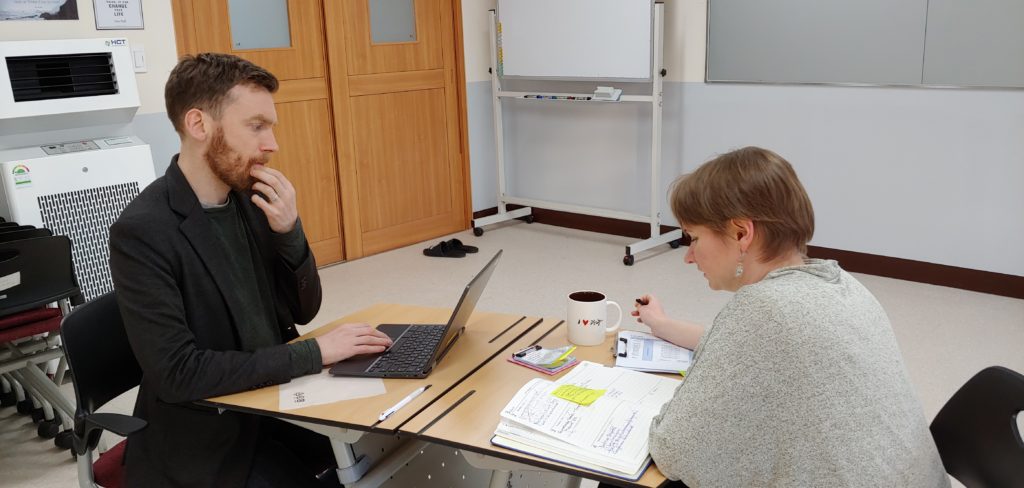
course of the school year.
GN: Why did you decide to move from teaching English learners to training English teachers?
Kristy: To be honest, when I left the Foreign Language Center [in Hwasun], I thought my EFL journey in Korea was over. I figured I’d gone just about as far as someone who wasn’t inclined to get a master’s could go. And then, while I was back in Canada trying to figure out my next step, a colleague reached out and suggested I apply for the position at the Jeollanamdo Education Training Institute (the pre-cursor to JIEI) that she would soon be leaving. It was the job of my dreams! So it wasn’t so much a conscious decision as a well-timed opportunity.
Peter: It was a well-timed opportunity for me as well. I was going through the process of getting hired through EPIK when I saw the posting for the JIEI positions on Facebook. It seemed like a step up on what I had been doing and, after teaching mostly by myself for seven years, it was a chance for me to be a part of a team with other teachers, and that appealed to me.
GN: Where do the teachers come from that you train at JIEI?
Kristy: The Korean English teachers (KETs) come from all over the province of South Jeolla and the native English teachers (NETs) come from the major English-speaking countries of South Africa, USA, Canada, England, and Australia/New Zealand.
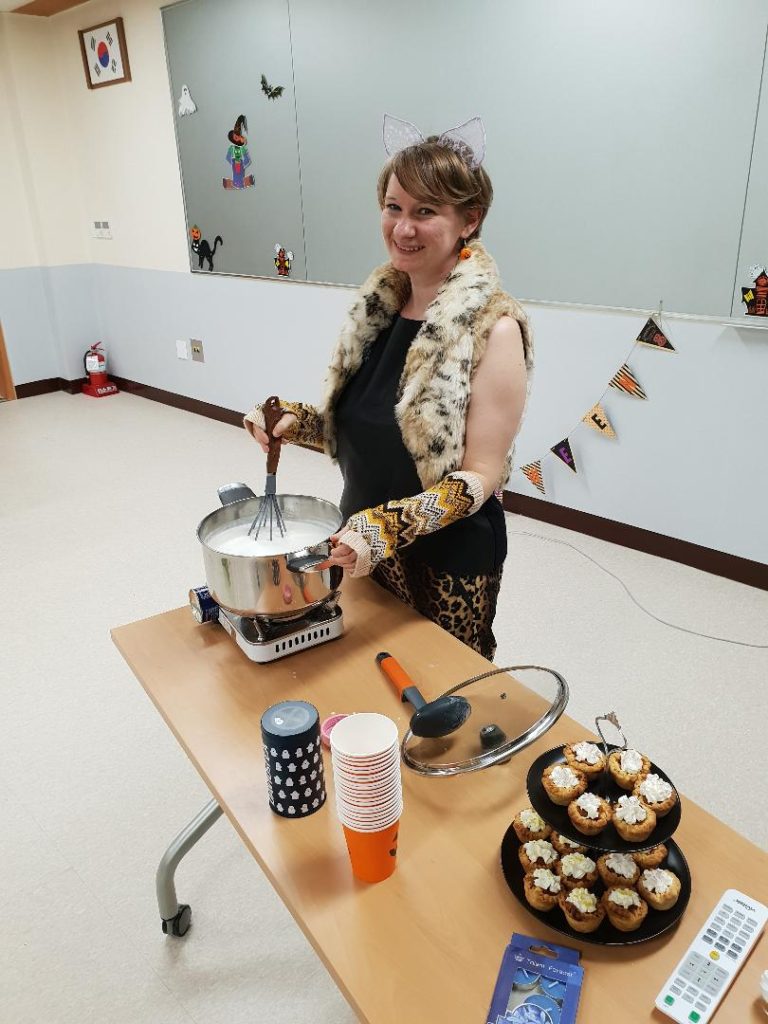
Night at JIEI.
GN: What kind of training programs does JIEI offer and how long are the training programs?
Kristy: We offer a lot of different training programs. Our biggest – and best, in my humble opinion as head teacher – is the six-month Intensive English Program for KETs. Secondary KETs come from all over the province to immerse themselves in English language study and practice, while also learning about new teaching methodologies with the goal of taking them back to their schools when they complete the program. Throughout the year, we also run 3–5 day English workshops for primary and secondary KETs, principals and vice principals, and administrative staff. Our team of native instructors is also largely responsible for giving presentations and watching teaching demos during the JLP and TaLK orientations.
Peter: Kristy and I have also given presentations at the first two professional development meetings that were held for re-signing NETs in the JLP program. The teacher trainers here also alternate teaching an eight-week course to any Yeosu citizens interested in learning English. The JLP and TaLK coordinators also play a big role in that.
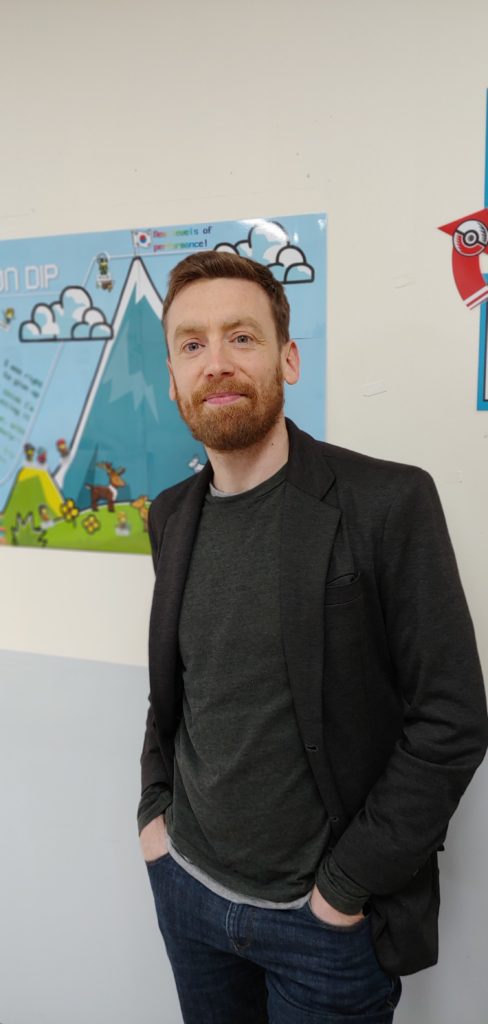
technology classroom at JIEI.
GN: I know that it’s difficult to make generalizations, but what would you say are some of the biggest differences in training Korean English teachers and expat English teachers?
Peter: Despite having some PD meetings and orientation presentations, we don’t do a ton of teacher training with expats. With that being said, however, I haven’t found there to be much of a difference. Most of the teachers that I’ve worked with, whether Korean or expat, have been receptive to new ideas and teaching methodology. The biggest difference has been in the level being taught (elementary, middle, high school), or the age of the teacher, as I’ve found that older teachers tend to have a harder time with educational technology.
In my experience, another difference is that the Korean English teachers usually have more constraints placed on them by the school curriculum and what they have to teach. There have been times where I’ve thrown out an idea for a lesson or suggested some educational technology to try, and I was either told directly in class or pulled aside afterwards (always kindly, of course) and told why it wouldn’t work in the context of a Korean classroom. It’s actually been a great eye-opener for me. I think it can be easy to make incorrect assumptions given some of the criticisms a lot of expats have about the Korean educational system. But, a lot of Korean teachers have those same criticisms and are trying their best to engage and educate students within that system.
GN: We often talk about “magical moments” that occur in the EFL classroom. Have you had similar moments during teacher training classes?
Kristy: The moment when KETs realize they don’t need to provide constant verbal English input to their students. This is called “running commentary,” and it occurs all the time in EFL classes. The teacher narrates the class by verbalizing everything he, she, or the students are doing. This is simply not necessary because it’s overwhelming for language learners. They need time to think in silence. But most teachers are very uncomfortable with silence in the classroom – especially a language classroom – so this takes a while to sink in. But when it does, it’s a real magical moment.
Peter: I teach writing and educational technology. Trainees tend to love the latter but overwhelmingly list the former as their least favorite thing to teach and as something they hated in their own language learning. Writing is important though: It gives students time to think and really use the grammar and vocabulary they’ve been taught. I try my best to give the teachers at JIEI writing activities that are engaging and fun regardless of age. It’s always great to see teachers have fun with a writing activity, especially when they produce something that’s so good they even surprise themselves!
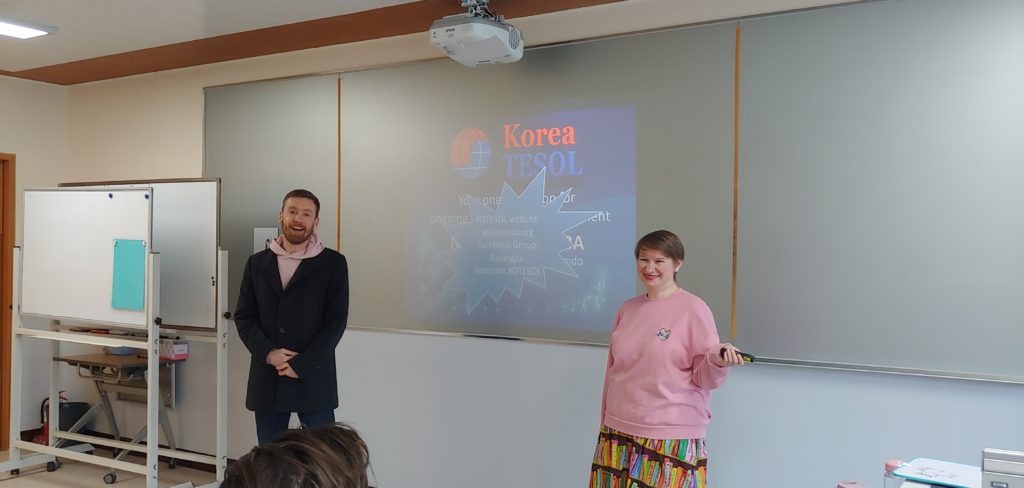
the most recent orientation at JIEI. Kristy presented on
questioning strategies and simple activities, while Peter taught
an introductory Korean class
GN: Which area or areas of English skills or teaching methodology do you feel that your trainees are most in need of improving?
Kristy: As the micro-teaching instructor, my biggest focus is giving simple and clear instructions for activities that have a big language payoff. I spend a lot of time working with the trainees on simplifying their language and analyzing textbook activities in terms of engagement and of setup versus payoff. If teachers reflect on these two areas, they can see a lot of improvement in their classes.
Peter: I think there’s room for improvement in how writing activities are approached. I like to show trainees how they can scaffold writing activities from word to sentence and, finally, to paragraph level to help students reach their learning objectives. Also, I like to show how things like visual supports in activities such as a picture walk activity can help give students the boost they need to produce fun, and more importantly, coherent stories.
GN: How receptive are your teacher trainees to being taught? Is there a sense among them of “I’m a teacher, I don’t need training”?
Kristy: There have been a few cases of that, certainly. But for the most part, the KETs who apply to our program are highly motivated to improve themselves and help their students achieve success.
Peter: Yes, I agree with Kristy.
GN: What’s the most difficult part about doing in-service training, and are you glad that you made the move from teaching EFL?
Kristy: Like I said earlier, teacher training is my dream job, so it’s really tough to identify “the most difficult part” without veering into “petty complaints” territory. I guess I’d have to say how critical it is for me to stay up to date on the latest research, methodology, and technology for education. Keeping current with education trends so that I can better serve the KETs and NETs who attend our programs can seem like an impossible task on days when I’m struggling to just clear all the basic responsibilities from my plate.
Peter: I’m glad I made the move over to teacher training. It’s been a challenge, and I feel I’m a better educator as a result. I do want to get back into the EFL classroom, however. Both have their pros and cons, but – despite the classroom management issues that can arise – I miss seeing students have that ah-ha moment when they really get something they didn’t understand before.
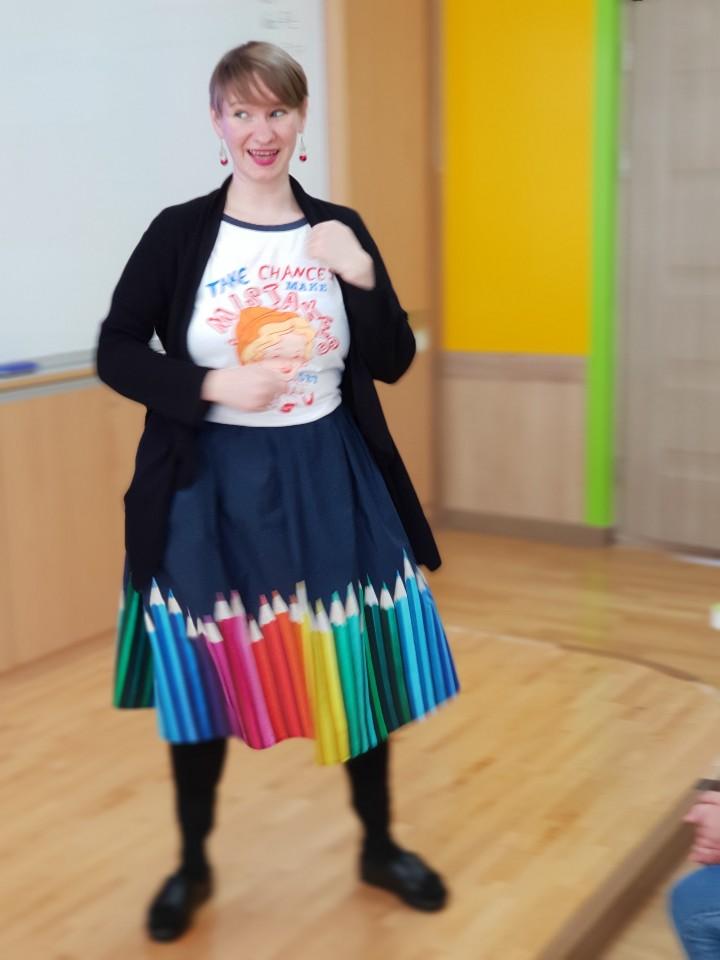
GN: As you are both active members of KOTESOL, I would like to ask how being a member might have impacted you and your teaching?
Kristy: Luckily, as an active member of KOTESOL, I can take a lot of that work and responsibility off my shoulders by attending the monthly meetings in Gwangju. I joined KOTESOL in 2013, and being a member has brought immense benefits to my personal and professional life. Not only have I grown my support and resource networks, but it’s also given me multiple opportunities to share my experiences and expertise, allowing me to really grow into the career EFL teacher that I am today. I really want to thank you and the people of KOTESOL for creating and maintaining that community of “teachers helping teachers.”
Peter: Getting to the monthly KOTESOL meetings prevents me from getting apathetic about my professional development. There’s such a wide variety of subject matter in the presentations that I’m constantly being challenged in different ways. Even the smaller presentations like “swap-shop,” where people quickly share ideas and activities, has been hugely beneficial. It’s been a great networking tool as well, as you’re surrounded by experienced educators every time you go. Finally, being a part of the local chapter has helped motivate me to get to the national and international conferences as well, which have been fantastic for a number of reasons. I’m grateful to be a part of the KOTESOL community. It has helped me immeasurable in the nearly two years I’ve been a member. It’s something that I can’t recommend strongly enough to other teachers here. Thank you for reaching out to us and giving us the opportunity to talk about this with others!
GN: And I thank both of you for the wealth of information you have provided about teaching teachers and about the JIEI programs. It sounds like teaching and taking courses at JIEI are both highly rewarding experiences.
THE INTERVIEWER
David Shaffer has been a resident of Gwangju and professor at Chosun University for many years. He has been with KOTESOL since its early days and is a past president of the organization. At present, as vice-president of the Gwangju-Jeonnam Chapter of KOTESOL, he invites you to participate in the teacher development workshops at their monthly meetings. Dr. Shaffer is presently the chairman of the board at the Gwangju International Center as well as editor-in-chief of the Gwangju News.







